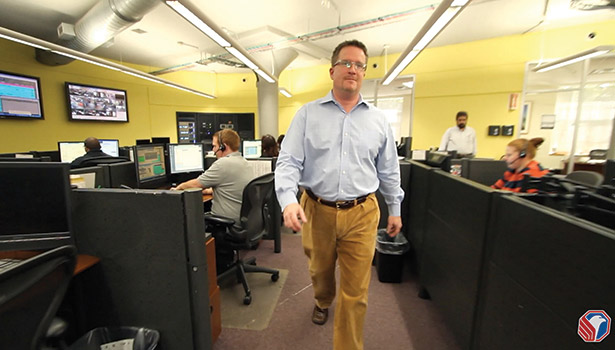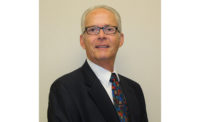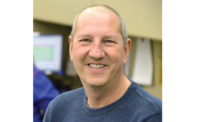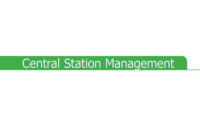Chris Newhook, central station manager at American Alarm & Communications, Arlington, Mass., is the winner of the 2014 Central Station Alarm Association’s (CSAA) Central Station Excellence Award for Manager of the Year. Newhook has 20 years of experience in the alarm industry, helping him to manage an immediate staff of 17 operators and three central station supervisors. His attention to detail and intimate knowledge of central stations makes him the perfect advisor for new employees. Newhook recently spoke with SDM to share his viewpoint on hiring and developing operators, as well as advice for other managers.
SDM: You hold CSAA Level 1 and Level 2 certifications, ESNT certification, and others. What is your opinion about the importance of continuing education in the central station business? What value does it bring to the business and to subscribers?
Newhook: Not just important — essential. At this point in the industry, technology seems to change faster than most companies can implement it. The days of getting by with “knowing-what-you-know” have long passed. Networking options, telecommunications, storage, workforce management, creating and maintaining the customer experience — the list goes on. Never turn down a training opportunity, and ask for more. Likewise, once you learn something, have a plan to pass it along.
If you’re with a smaller company that lacks training resources or you’re just starting out, industry magazines and websites, YouTube, Wikipedia and an endless stream of online technical resources are at your fingertips. The commitment to growth and development is the lynchpin to your success, and the success of the industry as a whole. Sharing that commitment with your customers leaves them with the peace of mind that they’ve hired professionals.
SDM: You were described by American Alarm’s Command Center director, Maria Moretti, as having developed “the brightest, strongest central station staff we have ever seen.” How did you accomplish that?
Newhook: We have been fortunate in that several companies in our market offered us some prime candidates following restructuring. By the same token, our preparedness in being able to quickly and efficiently train those people has greatly helped.
We keep our recruitment campaign a constant even when we’re fully staffed, because I think it’s important to keep a toe in the talent pool. If you take a lean approach to workforce management, such a steady stream of applicants can be a great resource if you need to fill a slot quickly. A running shortlist of possibilities is like an insurance policy.
Our commitment to ongoing education has paid great dividends. When we expand or realign responsibilities, as we’ve done recently with data processing, we have capable, experienced players who transition with little to no additional training. For those operators who seek movement in a different direction, when able, we offer a variety of options both within the command center as well as in the business as a whole. I welcome this kind of movement, as you are generally working with a person who is engaged in his or her career path.
We offer a more-than-competitive industry rate for our operators as well as a wealth of incentive programs such as employee referral programs, a stipend payout for employee sales, and customer service recognition.
Finally, without respect, tolerance and understanding the whole thing is a non-starter. Overall, our turnover rate is quite small and I am confident this combination of communication, respect and a general desire to see people do well in a healthy workplace is what makes it all work.
SDM: What are the top three attributes that you look for when hiring new central station operators? How do you ascertain that a job-seeker has these skills?
Newhook: We have established a fairly robust recruitment program, but here are some considerations:
• Vision — Even for the entry level positions, we are looking for career people.
• Competency — Finding people with the exact skill set is rare, so we go with people who can offer the relevant attributes. It’s a very niche position. It requires a level of technical prowess, an incredible capacity for peripheral tasking all balled-up into someone capable of creating a delightful customer experience while maintaining a short turnaround time. High-end retail, teaching experience, call center support — these are usually the candidates that catch my attention. I am also a firm believer in supporting our military. Their training, attention to detail, focus and ability to excel in high-stress situations can be a phenomenal asset.
• Accountability — Seek out actual stories or anecdotes about their approach to customer service. I always ask for an example of a real problem they experienced working with a team member or a customer and how they managed to resolve it.
SDM: You’ve said that you can’t manage what you can’t measure, and this is an important aspect of your work. Please describe the key metrics that are most critical to your work as a manager, and how you use them to improve central station operations.
Newhook:
- Alarm monitoring response time (from where the event hits automation to the time it drops to an operator), time to first call, event close out or turnaround.
- Phone — How quickly do your call-takers respond? How long do they spend with the customer? How many lost calls? What is the volume of inbound versus outbound calls?
- False alarm dispatch — “Your Alarm Factor,” a simple calculation of the number of active accounts divided by the number of actively monitored accounts, is crucial to keeping your false alarm rate down. You must have a manageable plan in place for addressing those accounts that, on a weekly basis, exceed a set number of dispatches.
- Quality monitoring — We monitor everything, but that’s not easy and requires a significant commitment of resources. Find what is realistic for you; a consistent 50 percent quality monitoring approach beats a sporadic quality management program every time.
- Customer feedback — We use an online survey site and send out five simple questions that capture the essence of the customer experience and elicit feedback.
SDM: What advice would you offer to someone new to a central station management role?
Newhook:
- Set goals immediately.
- Learn everything; no job is outside of your responsibility.
- Be someone people want to work with and not against.
- Look beyond your immediate team and establish a strong network of support as soon as you hit the ground.
- Prepare constantly. It’s the old saying, “Hope for the best, plan for the worst.”
- Mentor. Be invested in your team’s growth.
- Track and deal with problems right away. Your one under-performing operator will have a significant impact on the customer’s experience.
- Don’t take it personally. People react differently to stress and ours is an environment where things can get pretty hectic quickly. Stay focused, prepare your people, keep calm and order pizzas!
- Make it personal. It may not be your name on the check or the company sign, but work like it is.
- Watch your work hours; if your work day ends at 5 o’clock, you’ve got a job — not a career. Work on that.
SDM: We know American Alarm is a charter member of the CSAA’s ASAP-to-PSAP program. How are things going?
Newhook: We are currently live — in production — with Richmond Va., Washington D.C., and Phoenix, Ariz. Boston is progressing well and we are hopeful for testing to begin shortly after the start of the New Year. We’ve seen strong interest in several other New England cities and Northeastern states as well. With the current NexGen 911 initiative, there’s been a bit of a groundswell which has helped.
I think CSAA is doing some great work in building the project and promoting ASAP among its membership, but it’s still very much a one-PSAP-at-a-time march. It’s a no-brainer. Turning the worst call a 911 dispatcher has to take into one of the easiest through software, in many cases, already in place, is a win for the alarm companies, the PSAPs and the community as a whole.










